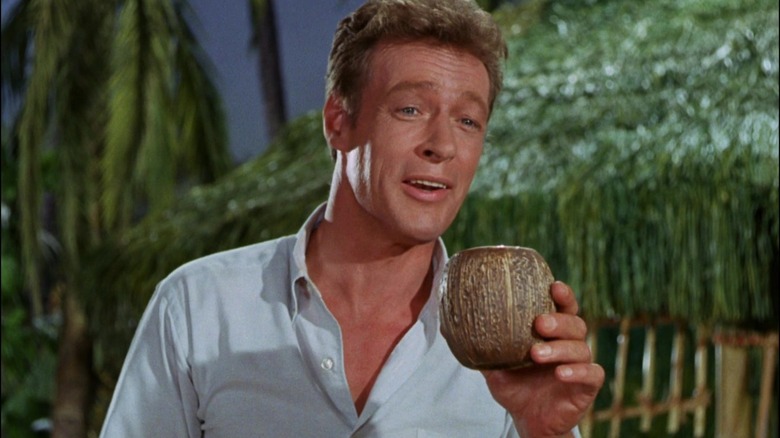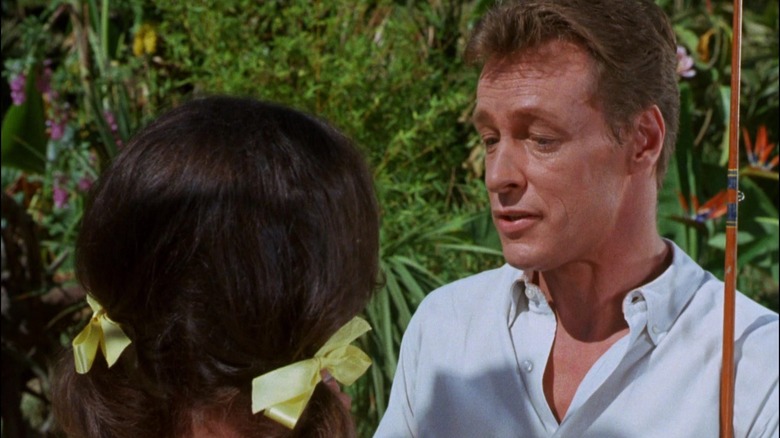We may receive a commission on purchases made from links.

CBS Television Distribution
Author Paul A. Cantor suggested in his book "Gilligan Unbound: Pop Culture in the Age of Globalization" that Sherwood Schwartz's 1964 sitcom "Gilligan's Island" stood as a confident symbol for the triumph of American democracy during the post-war Baby Boom. Cantor noted that the series essentially created a random seven-character cross-section of the United States, and then abandoned them in a remote location. Despite their isolation and lack of resources, the seven stranded castaways formed a functional democracy. The rich and the poor, the farmers and the intelligentsia, actors and sailors, all became fast friends and easily set up shelter and systems of acquiring food.
Additionally, Schwartz assembled a great ensemble of diverse character types, allowing them all to serve a particular dramatic function. Sure, the castaways were broad archetypes without much richness or complexity, but they certainly functioned. The machine-like efficiency of the series drew in millions of viewers, and assured "Gilligan's Island" would be a hit show. A sweet, sweet syndication deal kept reruns on the air for generations, allowing people raised on "Gilligan's Island" to raise their own children on it as well. The show's broad archetypes became America's Commedia Dell'arte.
Gilligan (Bob Denver) was the key to the series, of course, as his buffoonish antics foiled every rescue attempt, and allowed the series to continue. Five of the other castaways tended to react to Gilligan with equal comedic fervor, providing little more than color commentary from their own perspective. Gilligan does a pratfall, and Mr. Howell makes a gag. Laugh track. Only one character served as a straight man in the troupe: the Professor, played by Russell Johnson.
Johnson once gave an interview with The North Adams Transcript, handily transcribed by MeTV, and he explained that the Professor was vital to the functionality of the series, as he was the only one to offer a note of sanity amid all the slapstick.
The Professor provided a note of sanity to the insanity of 'Gilligan's Island'

CBS Television Distribution
It's worth remembering that "Gilligan's Island" takes place in a cartoonish universe, and that no character on the series ever went mad from hunger, or committed murder, and no one resorted to cannibalism on the desert island. Everyone's clothes were always clean, and scarcity was rarely an issue. The insanity Johnson referred to was merely comedic insanity. And while "Gilligan's Island" might have functioned well as a slapstick series with seven bumbling Gilligan types, it required a straight man who provided pragmatic solutions and explanatory dialogue. The Professor always handled such things. He was a reminder that the real world still existed.
In his interview, Johnson said:
"I'm the guy in the show who brings the characters back to sanity. I'm the link between the audience and reality. [...] I'm not locked in as being just a square. [...] I have a chance now and then to join in the fun."
One could make an argument that the Professor, while down-to-earth, also provided an element of comedic chaos into the series. He was the one who, after all, looked at his six stranded companions, and then thought, "Yes, I'm going to let one of these people use my brand-new jetpack."
In 2014, Johnson spoke to the Citizen's Voice, and he admits to finally accepting his legacy as the straight man on a goofy sitcom, happy to have brought so much joy to a mass audience. He said:
"It used to make me upset to be typecast as the Professor ... But as the years have gone by, I've given in. I am the Professor, and that's the way it is ... No one gets hurt. There are no murders, no car crashes. Just good, plain, silly fun. It's brought a lot of joy to people, and that's not a bad legacy."
And now he's an immortal character type in America's Commedia. Well done.






:quality(85):upscale()/2024/10/31/831/n/49351773/b7bf33836723d2f0643c55.51137847_.jpg)

:quality(85):upscale()/2024/10/29/581/n/1922153/3f2adeb76720db8a0484f8.73093870_.jpg)
 English (US) ·
English (US) ·